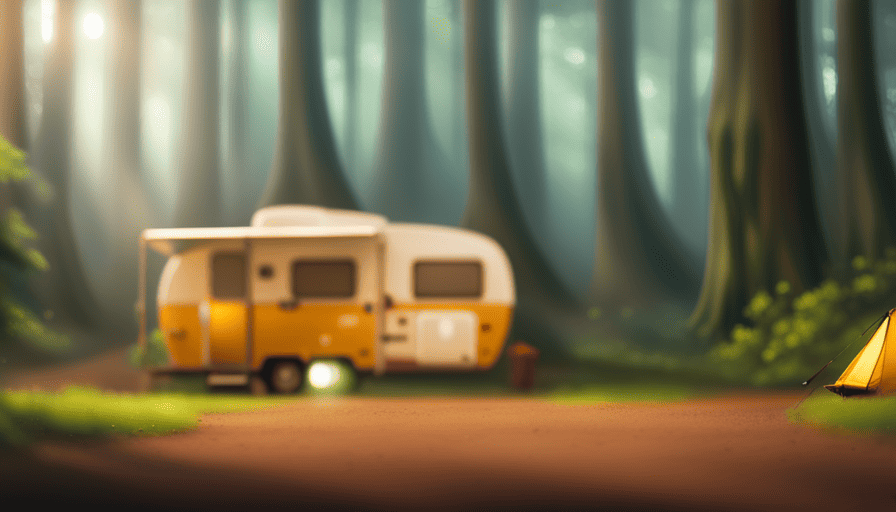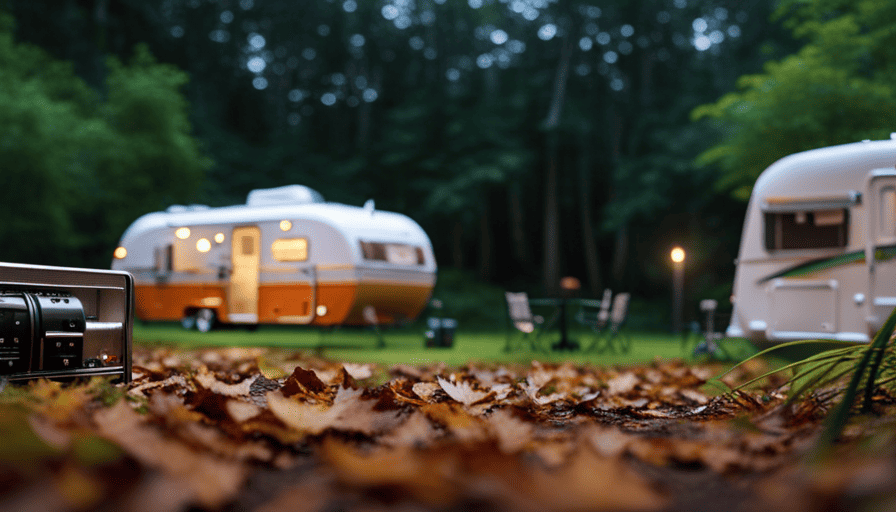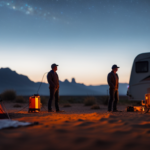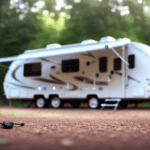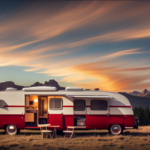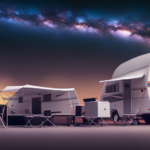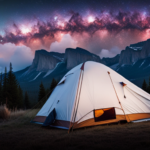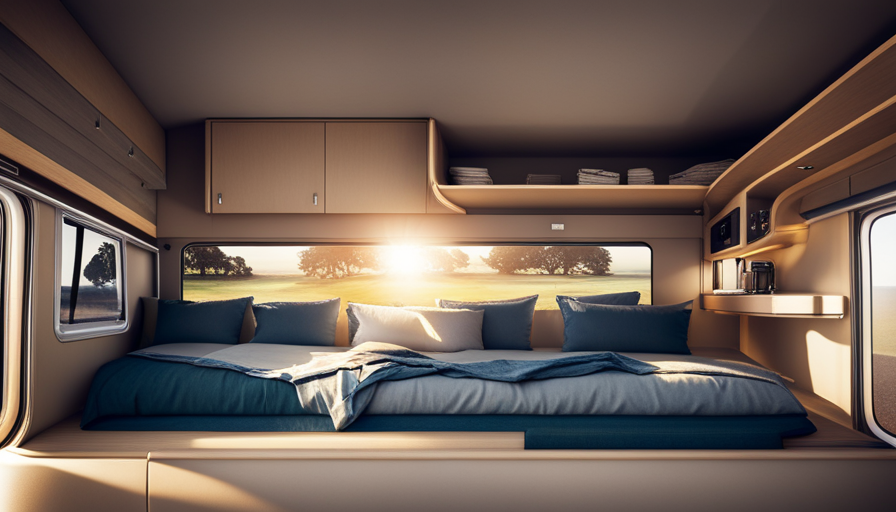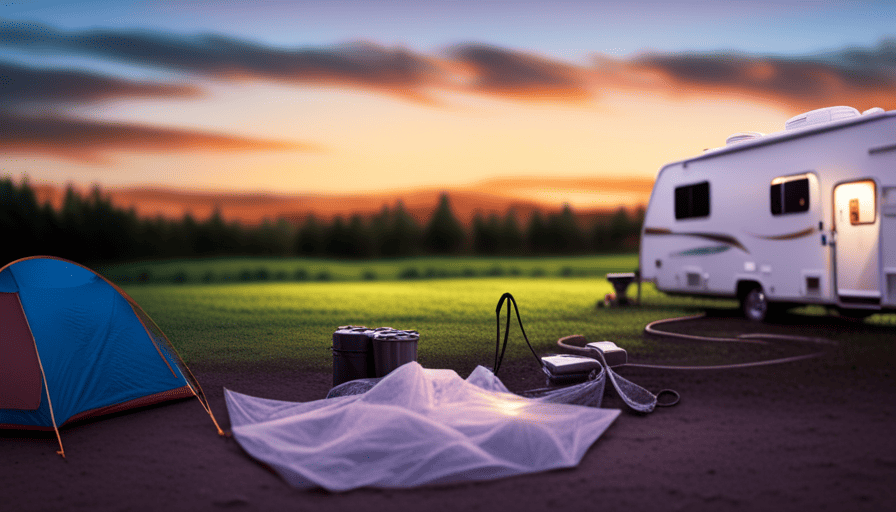Imagine this scenario: You’re driving down a winding road, surrounded by breathtaking scenery, enjoying the wind in your hair, and savoring the freedom of the journey ahead. You’re cozy in your camper, about to embark on a memorable adventure. But hold on for a moment. Have you thought about how you’ll power your camper? What size generator do you need to keep the lights on, the refrigerator cold, and your devices fully charged?
Well, fear not fellow campers, for I am here to guide you through this electrifying dilemma. In this article, we will delve into the world of generators and uncover the secrets to finding the perfect one for your camper.
We’ll assess your power needs, understand generator wattage, choose the right type, consider fuel efficiency, size, and weight, and even explore budget-friendly options.
So, whether you’re a seasoned camper or just starting out, join me on this enlightening journey as we unravel the mysteries of generator sizing. Let’s ensure that your camper is always powered up, allowing you to fully embrace the serenity of nature without sacrificing modern comforts.
Key Takeaways
- Assess power needs by making a list of appliances and devices
- Calculate total power requirements by adding up wattage ratings
- Choose a generator that can handle your power requirements
- Consider fuel efficiency and fuel type (gasoline or propane)
Assess Your Power Needs
Figuring out how much power you’ll need for your camper can be a bit tricky, but don’t worry, I’ve got you covered!
One of the first things you’ll need to consider is the generator power output. This is measured in watts and determines how much electrical load the generator can handle.
To calculate your power requirements, you’ll need to make a list of all the appliances and devices you plan to use in your camper. This includes things like the refrigerator, air conditioner, microwave, and any other electronics you’ll be using. Each of these items will have a wattage rating that you can find either on the device itself or in the user manual.
Add up all these wattage ratings to get the total power requirements for your camper.
Understanding generator wattage is important because you’ll need a generator that can handle the total power requirements you calculated. Generators come in different wattage capacities, so it’s crucial to match your power needs to the appropriate generator.
The last thing you want is to overload your generator and risk damaging both the generator and your camper’s electrical system. So keep your power requirements in mind when shopping for a generator and choose one that can handle the load.
Understand Generator Wattage
To properly power your camper, you’ll want to consider the wattage of the generator you choose, taking into account the specific appliances and electronics you’ll be using. Understanding generator wattage is crucial in ensuring you have enough power to run everything smoothly during your camping trips.
Here’s a breakdown of generator wattage for different types of appliances commonly found in campers:
-
Air Conditioner: Air conditioners typically require a significant amount of power, ranging from 1,000 to 3,500 watts. It’s important to factor in the size and efficiency of your AC unit when calculating wattage.
-
Refrigerator: Refrigerators generally consume around 600 to 800 watts, but this can vary depending on the model and size. Don’t forget to consider any additional power needed for a freezer unit.
-
Microwave: Microwaves have varying wattage requirements, but they typically fall between 600 and 1,200 watts. Make sure to check the specifications of your specific microwave to determine its power needs.
-
Lights and Electronics: The combined wattage of your lights, TV, laptop, and other small electronics can add up quickly. Consider the wattage of each device and calculate the total to ensure your generator can handle the load.
To calculate the overall wattage needed for your camper, add up the wattage requirements of all your appliances and electronics. This will give you a good estimate of the generator wattage you’ll need.
In the next section, we’ll discuss how to choose the right generator type based on your power needs.
Choose the Right Generator Type
When it comes to selecting the perfect generator for your camping adventures, it’s important to choose the right type that suits your power requirements. One key decision is whether to go with a portable or stationary generator.
Portable generators are easy to transport and provide flexibility in terms of where you can use them. They are typically fueled by gasoline and have a smaller power output, making them suitable for smaller campers or for running a few essential appliances.
On the other hand, stationary generators are larger and provide more power, making them ideal for larger campers or RVs. They are usually fueled by propane or natural gas, and they require professional installation.
Another factor to consider is whether to choose an inverter or conventional generator.
Inverter generators are more fuel-efficient and produce cleaner power, which is important for sensitive electronics like laptops and smartphones. They also run more quietly, making them ideal for camping in quiet environments.
Conventional generators, on the other hand, are generally more affordable and provide higher power output, but they may be louder and less fuel-efficient.
When considering the right generator type for your camper, it’s important to balance your power requirements, mobility needs, and noise preferences.
Now, let’s consider fuel type and efficiency in the next section.
Consider Fuel Type and Efficiency
One important aspect to consider is the efficiency of different fuel types, as it can greatly impact the performance of your power source during camping adventures. When choosing a generator for your camper, it is crucial to select a fuel type that maximizes fuel efficiency. The two most common fuel types for generators are gasoline and propane.
Gasoline generators are popular due to their widespread availability and affordability. However, they tend to be less fuel-efficient compared to propane generators. Gasoline generators also produce more noise and emit more exhaust fumes, which can be a concern for campers seeking a quieter and cleaner camping experience. On the other hand, propane generators are known for their higher fuel efficiency and quieter operation. They burn propane fuel more efficiently, resulting in longer run times and reduced fuel consumption.
To better understand the differences between gasoline and propane generators, let’s take a look at the following table:
| Fuel Type | Fuel Efficiency | Generator Noise |
|---|---|---|
| Gasoline | Less efficient | Louder |
| Propane | More efficient | Quieter |
Considering fuel efficiency and generator noise is crucial when determining the right generator for your camper. By opting for a fuel-efficient and quiet generator, you can enhance your camping experience. Now, let’s move on to the next section and determine the size and weight of the generator needed for your camper.
Determine the Size and Weight
When determining the size and weight of a generator for my camper, two key points to consider are portable and compact generators, as well as my camping setup and available storage space.
Portable and compact generators are ideal for camping because they’re lightweight and easy to transport. They’re designed to be space-saving, making them a convenient choice for campers with limited storage space.
By considering these factors, I can ensure that I choose a generator that’s both practical and suitable for my camping needs.
Portable and Compact Generators
Portable and compact generators are the perfect solution for powering your camper. When it comes to portable generator fuel options, you have a few choices. Most portable generators run on gasoline, which is readily available and easy to refuel. However, some models also offer the option to use propane, which is a cleaner-burning fuel and can be more convenient for camping trips.
In addition to fuel options, noise reduction techniques are important to consider. Look for generators with noise reduction features, such as insulated casings or mufflers, to ensure a quieter camping experience. It’s also essential to consider your camping setup and storage space.
Compact generators are designed to be easily stored and transported, so they won’t take up much valuable space in your camper. With these factors in mind, you can find the perfect portable and compact generator for your camper setup.
Consider Your Camping Setup and Storage Space
To fully embrace the camping experience, it’s crucial to factor in your setup and storage space when selecting a compact generator. Consider the power supply and electrical requirements of your camper to determine the size of generator you need. Here are three important points to keep in mind:
-
Determine your power needs: Calculate the total wattage of all the appliances and devices you plan to run simultaneously in your camper. This will help you decide on the appropriate wattage capacity for your generator.
-
Consider the size and weight: Compact generators are designed to be portable and easy to carry. Make sure to choose one that fits your storage space and is light enough for you to transport comfortably.
-
Look for additional features: Some generators offer built-in inverters, USB ports, and multiple outlets, which can be useful for charging devices and powering various appliances.
Considering these factors will help you find a compact generator that meets your power requirements while fitting seamlessly into your camping setup.
Moving on to noise level and environmental impact, it’s important to find a generator that operates quietly and has minimal impact on the environment.
Noise Level and Environmental Impact
The noise level and environmental impact of a generator can greatly vary depending on its size and type. When choosing a generator for your camper, it’s important to consider its noise reduction techniques and how it may impact wildlife.
Generators can be quite noisy, especially if they’re larger and more powerful. However, there are noise reduction techniques available that can help minimize the sound produced by the generator. Look for generators that are specifically designed to be quiet, with features such as noise-absorbing materials and mufflers. These generators are often labeled as ‘low noise’ or ‘quiet’ generators.
In addition to noise, the environmental impact of a generator should also be taken into consideration. Generators emit exhaust fumes, which can contribute to air pollution. Some generators are designed to be more environmentally friendly, with lower emission levels and more efficient fuel consumption. By choosing a generator with a lower environmental impact, you can minimize your carbon footprint and help protect the environment.
Considering the noise level and environmental impact of a generator is crucial when choosing one for your camper. Next, we’ll explore another important factor to consider: the generator’s runtime.
Consider the Generator’s Runtime
Now that we’ve discussed the noise level and environmental impact of generators, let’s move on to the next important factor to consider: the generator’s runtime.
The runtime of a generator refers to how long it can continuously operate on a single tank of fuel before it needs to be refueled. This is crucial to know when choosing a generator for your camper, as it directly affects how long you can power your appliances and devices while on the road.
When looking at generator runtime, it’s important to consider your specific needs and usage. If you plan on using your camper for extended periods of time without access to electrical hookups, you’ll want a generator with a longer runtime. This will ensure that you have enough power to last throughout your trip without constantly needing to refuel.
Additionally, it’s worth noting that generator fuel consumption can vary depending on the load it is powering. Higher loads, such as air conditioners or microwaves, will consume more fuel and decrease the overall runtime of the generator. Therefore, it’s important to take into account the power requirements of your camper’s appliances and devices when determining the appropriate generator runtime for your needs.
Now that we understand the importance of generator runtime and fuel consumption, let’s move on to the next step: considering your budget and price range.
Budget and Price Range
When it comes to choosing a generator for your camper, it’s important to set a budget that works for you. Consider how much you’re willing to spend and what features are essential for your needs.
Once you have an idea of your budget, it’s time to compare prices and features of different generators in the market. This will help you make an informed decision and ensure that you get the best value for your money.
Set Your Budget
Setting a budget for your camper generator is like charting the course of your camping adventure, guiding you towards the perfect balance between functionality and affordability. To ensure you make the right decision, consider these key factors:
-
Setting priorities: Determine what’s most important to you – whether it’s the generator’s size, noise level, fuel efficiency, or extra features like electric start or remote control.
-
Evaluating power usage: Calculate the power requirements of your camper, including the appliances and devices you plan to use. This’ll help you determine the wattage capacity your generator needs.
-
Considering future needs: Anticipate any potential upgrades or additional power requirements you may have in the future, so you don’t outgrow your generator too soon.
-
Researching brands and models: Look for reliable brands with good customer reviews and compare the features and pricing to find the best fit for your budget and needs.
With your budget set, it’s time to compare prices and features to make an informed decision.
Compare Prices and Features
To find the perfect fit for your budget and preferences, compare prices and features of different options available. When comparing generator brands, it’s important to consider both the price and the features they offer.
Some generators may be more expensive but come with added features such as automatic start, fuel efficiency, or noise reduction. On the other hand, there may be cheaper options that still provide the necessary power for your camper.
Additionally, it’s a good idea to read customer reviews and recommendations to get an idea of the overall satisfaction with a particular brand or model. Evaluating the pros and cons of using solar power for camping and RVing can also be helpful in making an informed decision.
Transitioning into the next section, let’s now read customer reviews and recommendations to get a better understanding of the performance and reliability of different generators.
Read Customer Reviews and Recommendations
Discover the delightful details and dependable devices in customer reviews to determine the perfect power-packed generator for your cozy camper. Here are three key points to consider when reading customer reviews:
-
Customer Satisfaction: Pay attention to the overall satisfaction level of customers who’ve purchased and used the generator. Look for positive feedback and high ratings, as this indicates that the generator is reliable and meets the needs of camper owners.
-
Common Issues: Take note of any common issues mentioned in the reviews. Look for patterns of problems that customers have encountered, such as noise levels, fuel consumption, or difficulty starting the generator. This will help you identify potential drawbacks or limitations of different models.
-
Recommendations: Look for customer recommendations on specific generator models that are well-suited for campers. These recommendations can provide valuable insights and help narrow down your options.
By reading customer reviews and considering factors like customer satisfaction and common issues, you can make an informed decision when choosing the right generator for your camper. However, to ensure you have all the necessary information, it’s also important to seek expert advice before making your final selection.
Seek Expert Advice
Get the best advice from experts who can guide you in finding the perfect power solution for your cozy camping experience. When it comes to choosing the right generator for your camper, seeking expert advice is crucial.
These professionals have the knowledge and experience to help you avoid common mistakes and make an informed decision. Expert recommendations play a vital role in determining the size of generator you need for your camper. They’ll consider factors like the size of your camper, the appliances you plan to run, and the duration of your camping trips.
By understanding your specific needs, they can recommend a generator that’ll provide sufficient power without being excessive. One common mistake many campers make is purchasing a generator that’s too small for their needs. This can lead to power shortages and frustration. On the other hand, buying a generator that’s too large can be wasteful and unnecessary.
Expert advice can help you find the right balance and ensure that you have enough power to run all your essential appliances without any issues. Don’t rely solely on customer reviews and recommendations when it comes to choosing the right generator for your camper. Instead, seek the guidance of experts who can provide personalized advice tailored to your specific requirements.
Avoid common mistakes by getting the right information from knowledgeable professionals.
Frequently Asked Questions
Are there any specific safety precautions I should take when using a generator for my camper?
When it comes to generator safety measures for your camper, there are a few precautions you should keep in mind.
First and foremost, regular generator maintenance is crucial to ensure its optimal performance and longevity. Make sure to follow the manufacturer’s guidelines for maintenance tasks such as oil changes and filter replacements.
Additionally, always operate the generator in a well-ventilated area to prevent carbon monoxide buildup.
Lastly, use a carbon monoxide detector inside your camper for added safety.
Can I use a portable generator for my camper, or do I need a built-in generator?
You can use a portable generator for your camper, but there are pros and cons to consider. Portable generators are convenient because you can easily move them around and use them for other purposes. However, they may not have as much power as a built-in generator and can be noisier.
Built-in generators are more powerful and quieter, but they’re typically more expensive and require professional installation. Ultimately, the choice depends on your specific needs and budget.
How often should I service and maintain my generator?
You should service and maintain your generator regularly to ensure it functions properly. Common maintenance tasks for a camper generator include oil changes, air filter cleaning/replacement, spark plug inspection/replacement, and fuel system maintenance. How often you should service your generator depends on the manufacturer’s recommendations, but a good rule of thumb is to have it serviced at least once a year or every 100 hours of use.
Regular maintenance will help prolong the life of your generator and prevent any unexpected issues while on the road.
Can I use a generator to power all the appliances in my camper at the same time?
Yes, you can use a generator to power all the appliances in your camper at the same time. However, it’s important to consider the pros and cons.
On one hand, using a generator provides a reliable source of power, especially if you’re in a remote location. On the other hand, generators can be noisy, require fuel, and emit fumes.
Alternatively, using solar panels for power in a camper is a quieter and more environmentally friendly option.
Are there any government regulations or restrictions on using generators in campgrounds or RV parks?
Yes, there are government regulations and restrictions on using generators in campgrounds or RV parks. These regulations are in place to ensure the safety and comfort of all campers. Government regulations may include noise restrictions to minimize disturbances to other campers.
It’s important to check the specific regulations of the campground or RV park you plan to visit before using a generator. This will help you understand any limitations or requirements regarding generator usage.
What is the Average Cost of a Pop Up Camper That Requires a Generator?
The pop up camper price guide provides valuable information on the average cost of a pop up camper that requires a generator. This resource is essential for potential buyers, as it helps them make informed decisions and budget accordingly. By consulting the pop up camper price guide, individuals can find a suitable camper within their price range that meets their specific needs.
Conclusion
In conclusion, finding the right generator for your camper can be quite the task. It’s important to carefully assess your power needs and understand the wattage requirements.nnChoosing the right type of generator and considering fuel efficiency are also crucial factors.nnDon’t forget to take into account the size and weight, as well as the runtime.nnBudget and customer reviews can also guide your decision.nnAnd if all else fails, seek expert advice.nnHappy camping!

